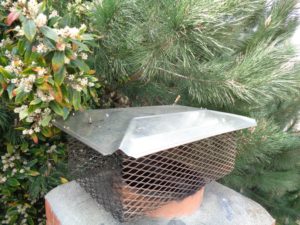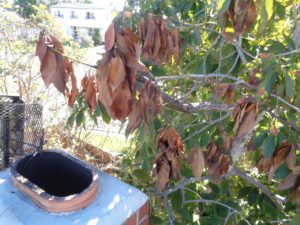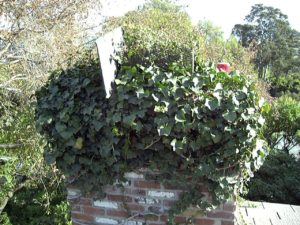 How many times do we, as chimney sweeps, advise a customer to contact someone that does tree removal services, a landscaper or a gardener? More often than you think!
How many times do we, as chimney sweeps, advise a customer to contact someone that does tree removal services, a landscaper or a gardener? More often than you think!
The rule of thumb is to keep trees at least ten feet from the top and at least two feet below the top of the chimney. Certainly, no branches should ever overhang the chimney.
Here are eight very good reasons why
1) Branches overhanging a chimney will drop leaves and needles inside the flue, causing a fire hazard. In our experience, pine needles can be the worst.
2) Branches too close to the top of the chimney can catch the tree on fire.
 3) Trees too close to the house are a gateway for animals and insects to crawl on top of the roof and enter the home through the chimney. Something similar happened in our very own home so I speak from experience. One night we heard something on top of our roof. We went outside and saw a raccoon peering down at us from the edge of the roof. He had climbed up on the roof from the tree next to our house. Only the chimney cap prevented the raccoon from entering the chimney.
3) Trees too close to the house are a gateway for animals and insects to crawl on top of the roof and enter the home through the chimney. Something similar happened in our very own home so I speak from experience. One night we heard something on top of our roof. We went outside and saw a raccoon peering down at us from the edge of the roof. He had climbed up on the roof from the tree next to our house. Only the chimney cap prevented the raccoon from entering the chimney.
4) Smoking problems when using your fireplace can be caused by a tall tree next to the top of the chimney causing downdraft issues.
5) The roots of a large tree can uproot the foundation of the chimney and can create a cracked slab in the concrete foundation of the house.
6) The smoke and gases from the fire going up the flue will affect foliage on the nearby tree, singeing the leaves and even killing a tree.
 7) Ivy and other vine-like vegetation growing on the chimney may look beautiful but will damage the masonry and will leave permanent unsightly marks on the chimney after removal. Also, ivy can eventually travel and grow inside the chimney, creating a fire hazard.
7) Ivy and other vine-like vegetation growing on the chimney may look beautiful but will damage the masonry and will leave permanent unsightly marks on the chimney after removal. Also, ivy can eventually travel and grow inside the chimney, creating a fire hazard.
8) During heavy wind-driven storms or thunderstorms, overhanging tree branches can break off and damage the top of the chimney and the roof, causing expensive repairs.
Of course, a chimney cap will help in some of these cases but not all. It’s far better to keep trees away from chimneys.
